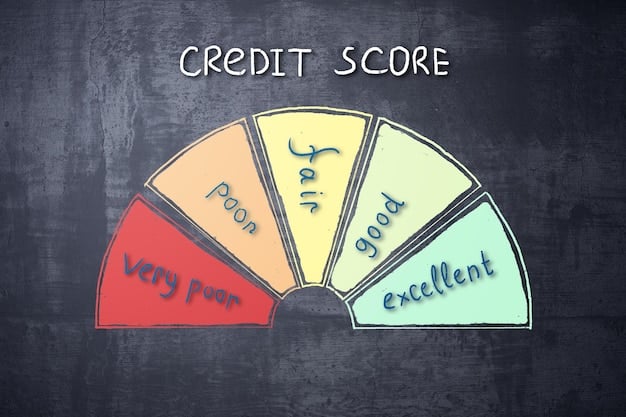Understanding Credit Scores: Improve Yours for Better Loan Rates

Understanding credit scores is crucial for securing favorable personal loan rates; this article delves into the factors influencing your credit score and outlines actionable steps to improve it, ultimately unlocking better financial opportunities.
Are you looking to secure a personal loan with the best possible interest rate? Understanding credit scores: How to improve yours and secure better personal loan rates is the key. A good credit score can unlock better financial opportunities, while a poor one can limit your options and increase your borrowing costs.
What is a Credit Score and Why Does it Matter?
A credit score is a three-digit number that represents your creditworthiness. Lenders use it to assess the risk of lending you money. The higher your score, the lower the risk you pose to lenders, and the better the interest rates you’re likely to receive on loans and credit cards. Understanding the importance of your credit score is the first step towards improving it.
Your credit score isn’t just important for loans; it can also impact other areas of your life, such as renting an apartment, getting approved for insurance, and even obtaining certain jobs. Therefore, maintaining a good credit score is essential for overall financial well-being.
Different Credit Scoring Models
While there are several credit scoring models, the two most common are FICO and VantageScore. Each model uses slightly different algorithms to calculate your score, but they both consider similar factors. Understanding the nuances of these models can help you better manage your credit profile.
- FICO Score: The most widely used credit scoring model by lenders. It ranges from 300 to 850.
- VantageScore: A competing model developed by the three major credit bureaus (Equifax, Experian, and TransUnion). It also ranges from 300 to 850.
- Key Differences: VantageScore tends to be more lenient towards individuals with limited credit history compared to FICO.

Ultimately, knowing your credit score and understanding how it’s calculated is crucial for making informed financial decisions. By actively managing your credit, you can improve your score and unlock better interest rates and financial opportunities.
Factors That Impact Your Credit Score
Several factors influence your credit score. Understanding these factors is crucial for maintaining and improving your creditworthiness. These factors are generally consistent across different credit scoring models, although their weighting may vary.
Knowing what impacts your credit score allows you to take proactive steps to manage your credit behavior and ultimately improve your standing with lenders. By focusing on these key areas, you can build a solid credit foundation.
Payment History
Payment history is the most significant factor influencing your credit score. It reflects whether you’ve made past credit payments on time. Late payments, even by a few days, can negatively impact your score.
Credit Utilization Ratio
Credit utilization ratio is the amount of credit you’re using compared to your total available credit. Experts recommend keeping your credit utilization below 30%. High credit utilization signals to lenders that you may be overextended.
Length of Credit History
The length of your credit history also plays a role. A longer credit history typically results in a higher credit score, as it provides lenders with more data to assess your creditworthiness. If you’re just starting out, be patient as your credit history grows.
- Keep Old Accounts Open: Even if you’re not using them, consider keeping old credit card accounts open (as long as they don’t have annual fees) to maintain a longer credit history.
- Avoid Opening Too Many Accounts at Once: Opening multiple new accounts in a short period can negatively impact your score.
- Be Patient: Building a solid credit history takes time. Don’t expect to see significant improvements overnight.
By addressing each of these factors, you can take control of your credit score and work towards achieving a strong financial profile. Consistent and responsible credit management is the key to long-term success.
Strategies to Improve Your Credit Score
Improving your credit score requires a proactive approach. Fortunately, there are several effective strategies you can implement to boost your creditworthiness. These strategies focus on addressing the key factors that influence your credit score.
It’s important to remember that improving your credit score is a marathon, not a sprint. Consistent effort and responsible financial habits will yield the best results over time. Stay patient and focused on your long-term goals.
Pay Bills on Time
This is perhaps the most crucial step. Set reminders, automate payments, and ensure you never miss a due date. Consistent on-time payments demonstrate responsible credit management.
Reduce Credit Utilization
Aim to keep your credit utilization below 30%. Pay down your balances regularly to achieve this goal. Consider making multiple payments throughout the month to further reduce your utilization ratio.
Consider a Secured Credit Card
If you have bad credit or limited credit history, a secured credit card can be a valuable tool. It requires a security deposit that typically serves as your credit limit. Responsible use of a secured card can help you build or rebuild your credit.
- Report to Credit Bureaus: Ensure that the issuer reports your payment activity to the major credit bureaus.
- Responsible Usage: Use the card responsibly and make timely payments.
- Graduate to an Unsecured Card: After a period of responsible use, consider graduating to an unsecured credit card.
By consistently implementing these strategies, you can gradually improve your credit score and unlock better financial opportunities. Remember to monitor your progress and adjust your approach as needed to achieve your goals.
Understanding Personal Loans and Interest Rates
Personal loans can be a useful financial tool for various purposes, such as debt consolidation, home improvements, or unexpected expenses. However, understanding how interest rates work and how they’re determined is crucial for making informed borrowing decisions.
Being informed about personal loans and interest rates empowers you to make smart financial choices. By understanding the factors that influence interest rates, you can shop around for the best deals and minimize your borrowing costs.
Factors Affecting Personal Loan Interest Rates
Several factors affect the interest rates you’ll receive on a personal loan. These factors include your credit score, income, debt-to-income ratio, and the loan term. Lenders use these factors to assess the risk of lending you money.
Comparing Loan Offers
Always compare loan offers from multiple lenders before making a decision. Pay attention to the interest rate, fees, repayment term, and any other loan terms. Use online tools and calculators to compare the total cost of different loans.

Understanding the intricacies of personal loans and interest rates is essential for responsible borrowing. By doing your research, comparing offers, and understanding the terms, you can secure a loan that meets your needs and fits your budget.
Maintaining Good Credit Habits for the Long Term
Building a good credit score is only the first step. Maintaining good credit habits over the long term is essential for continued financial success. This requires consistent effort and a commitment to responsible credit management.
By adopting these habits and making them a part of your financial routine, you can maintain a healthy credit score and enjoy the benefits of good credit for years to come. Remember that responsible credit management is a continuous journey, not a destination.
Regularly Monitor Your Credit Report
Check your credit report regularly for errors or inaccuracies. You’re entitled to a free credit report from each of the major credit bureaus (Equifax, Experian, and TransUnion) every 12 months. You can access these reports through AnnualCreditReport.com.
Avoid Maxing Out Credit Cards
As mentioned earlier, keeping your credit utilization low is crucial. Avoid maxing out your credit cards, as this can negatively impact your credit score. Instead, aim to keep your balances well below your credit limits.
Be Mindful of New Credit Applications
Avoid applying for too much credit at once. Each credit application can trigger a hard inquiry on your credit report, which can slightly lower your score. Only apply for credit when you genuinely need it.
Maintaining a good credit score is an ongoing process that requires commitment and discipline. By following these tips and staying informed about your credit health, you can safeguard your financial future and continue to reap the rewards of good credit.
| Key Point | Brief Description |
|---|---|
| 📈 Credit Score Factors | Payment history, credit utilization, and credit history length. |
| ✅ Improvement Strategies | Pay bills on time, reduce credit utilization, and monitor credit reports. |
| 💰 Personal Loans & Rates | Understand rates, compare offers, and maintain good habits. |
| 🛡️ Long-Term Credit Health | Monitor reports, avoid maxing cards, and be mindful of new applications. |
Frequently Asked Questions (FAQ)
▼
A good credit score typically falls within the range of 670 to 739 on the FICO scale. Scores above 740 are considered excellent, while scores below 670 may make it more difficult to secure loans.
▼
You should check your credit report at least once a year. It’s also a good idea to monitor your credit more frequently if you’re planning to apply for a loan or make a major purchase.
▼
Credit utilization ratio is the amount of credit you’re using compared to your total available credit. It’s calculated by dividing your outstanding balances by your credit limits. Aim to keep it below 30%.
▼
The time it takes to improve your credit score varies depending on your individual circumstances. Some strategies, such as paying down balances, can have a relatively quick impact, while others take more time.
▼
If you find errors on your credit report, dispute them with the credit bureau that issued the report. Provide documentation to support your claim, and the bureau is required to investigate and correct the error.
Conclusion
Understanding credit scores: How to improve yours and secure better personal loan rates is vital in today’s financial landscape. By grasping the factors influencing your credit score and implementing effective strategies to improve it, you can unlock better interest rates, secure favorable loan terms, and achieve your financial goals. Remember that building and maintaining good credit is a continuous process that requires diligence and responsible financial habits.





